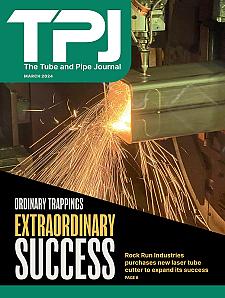Founder
- FMA
- The Fabricator
- FABTECH
- Canadian Metalworking
Categories
- Additive Manufacturing
- Aluminum Welding
- Arc Welding
- Assembly and Joining
- Automation and Robotics
- Bending and Forming
- Consumables
- Cutting and Weld Prep
- Electric Vehicles
- En Español
- Finishing
- Hydroforming
- Laser Cutting
- Laser Welding
- Machining
- Manufacturing Software
- Materials Handling
- Metals/Materials
- Oxyfuel Cutting
- Plasma Cutting
- Power Tools
- Punching and Other Holemaking
- Roll Forming
- Safety
- Sawing
- Shearing
- Shop Management
- Testing and Measuring
- Tube and Pipe Fabrication
- Tube and Pipe Production
- Waterjet Cutting
Industry Directory
Webcasts
Podcasts
FAB 40
Advertise
Subscribe
Account Login
Search
Hiring and nurturing interns pays off in manufacturing
How the industry can onboard and invest in the next generation
- By Lisa Wertzbaugher
- August 22, 2022
- Article
- Shop Management
Many of you know my husband and I own a small welding fabrication business in eastern Iowa. Onboarding Gen Z interns is a popular topic these days, and with a new school year quickly approaching, it’s the perfect time to go over some best practices to ensure that your new hires get off to the best start possible.
Creating the Job Description
The first step for any new position is creating a job description that defines both general and specific daily tasks and duties, reporting responsibilities, and schedule. All candidates want to see a job description to better understand the role they are interviewing for, but this is even more critical with Gen Z than with other ages. Younger candidates are used to lots of instruction and guidance.
“Intern” is a broad term and less defined than most roles, such as office manager or quality technician. We created a role that rotates through various departments within our business, which is mutually beneficial for the company and the intern. We can fill gaps in those departments as needs change throughout the year, and our intern learns all aspects of the business.
Filling the Position
Finding talent is always tricky—or should I say, nearly impossible. Our best hires usually come from friends-and-family referrals. We also use social media to post jobs, with decent success. Typically, our interns are college age (Gen Z), and these methods are even more successful for them.
We also find our younger employees are very connected to their parents and consult with them on most major life decisions, especially when it comes to employment.
We recruited our current intern through a conversation with his parents. He was sorting out some post-high school options, and we suggested an internship to his parents, who discussed it with him. He started a week later.
Do not discount anyone in your social circle or family network. You must cast a wide net and ensure people are aware of the opportunities at your company.
Ongoing Management
No doubt, young employees make mistakes. They are often learning on the job and have not had the sink-or-swim upbringing of older generations. However, we all have made mistakes along the way.
Two things we’ve decided to change to mitigate mistakes in the future are to add more management and extend the time interns fill in each position.
More Management. Any new employee, Gen Z or otherwise, will be much more successful with an engaged manager. When onboarding younger employees, providing good management and mentoring is not just nice, it is a necessity. Gen Z employees have options, and they will not stick around if they are left to flounder.
When I was hired for my first real sales job, I was thrown into a territory in Iowa and saw my boss two times in the first year. I could barely get a return phone call from him, but somehow, I figured it out. Looking back, I would have had more success more quickly if I had had more guidance.
More Time. We also have committed to giving our interns more time in each department. We used to rotate interns every three to six months, but some positions require six to 12 months to develop proficient skills. This is another way to ensure that your new employees flourish instead of flounder.
Exit Strategy
The nature of an internship is temporary, which causes some small businesses to shy away from the role. Smaller companies have a smaller head count, and new workers are typically hired based on significant need. An intern seems like a luxury that only large companies can afford.
Not true. Running a small business is about wearing lots of hats and weathering the storm of growing pains. Plugging in temporary support is a great option for filling gaps until the business can support a full-time hire. Hiring an employee that you know will depart in one or two years is not a burden when you have a defined plan to use them while they are there and backfill with full-time employment, if necessary, when they depart.
Our intern is interviewing and will take a full-time position elsewhere within the next six months. We are helping him with that process. He will be missed, but if we support him as he ventures into the world, he may return to us someday as a more experienced and valuable resource.
About the Author

About the Publication
Related Companies
subscribe now

The Tube and Pipe Journal became the first magazine dedicated to serving the metal tube and pipe industry in 1990. Today, it remains the only North American publication devoted to this industry, and it has become the most trusted source of information for tube and pipe professionals.
start your free subscription- Stay connected from anywhere

Easily access valuable industry resources now with full access to the digital edition of The Fabricator.

Easily access valuable industry resources now with full access to the digital edition of The Welder.

Easily access valuable industry resources now with full access to the digital edition of The Tube and Pipe Journal.
- Podcasting
- Podcast:
- The Fabricator Podcast
- Published:
- 04/16/2024
- Running Time:
- 63:29
In this episode of The Fabricator Podcast, Caleb Chamberlain, co-founder and CEO of OSH Cut, discusses his company’s...
- Trending Articles
Team Industries names director of advanced technology and manufacturing

Orbital tube welding webinar to be held April 23

Chain hoist offers 60-ft. remote control range

Push-feeding saw station cuts nonferrous metals

Corrosion-inhibiting coating can be peeled off after use

- Industry Events
16th Annual Safety Conference
- April 30 - May 1, 2024
- Elgin,
Pipe and Tube Conference
- May 21 - 22, 2024
- Omaha, NE
World-Class Roll Forming Workshop
- June 5 - 6, 2024
- Louisville, KY
Advanced Laser Application Workshop
- June 25 - 27, 2024
- Novi, MI



























